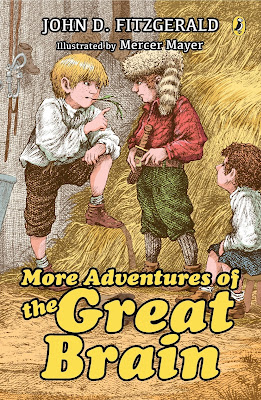Source of book: Audiobook from the library, but we own all the Great Brain books.
This book is the second in the series - although it was also the book I read first, because we obtained it first. I think the books make most sense if you read them in order, because the backstories of some of the various kids shed light on subsequent events. You can read my thoughts on The Great Brain from 2017 if you like.
This book was published in 1969, and the stories themselves are set back in the 1890s, the author’s childhood. Based loosely on the author’s childhood and his conniving elder brother Tom, the adventures are humorous, poignant, and shed a light on the experience of growing up “gentile” in Mormon Utah.
This book picks up where the last one left off. Tom has ostensibly “reformed,” but little brother J.D. (the narrator) and other observant folks know it is temporary. Now that he got that bike for Christmas, he is back to his old ways of tricking J.D. into doing his chores, swindling the other kids, and getting himself into trouble by being too smart for his own good.
As in the previous book, there are humorous stories, but some fairly heavy themes. In perhaps the most pointed episode, Tom decides he wants to prove to his dad (who runs the newspaper) that he is old enough to help out. He borrows the old (smaller) printing press, and sets up shop. He enlists his friends to report, with the idea of printing better news than his dad.
In a stroke of luck, the bank is robbed before the first edition comes out, and Tom comes up with a plan whereby Basil (the Greek immigrant kid) is able to overhear a conversation between the robbers, and thus solve the crime.
The problem is that most of the rest of what Tom prints are the vicious gossip of the townsfolk, and the victims show up to protest and in some cases brawl. Tom learns the hard way that just because something can be printed doesn’t mean it should. (A lot of right wing media sorts could stand to learn this lesson these days - even if slandering immigrants and other minority groups does sell well.)
In other stories, the town dog dies and is given an elaborate funeral, Tom inadvertently starts a panic over “monster” footprints he creates in order to win a bet, tries to prove the non-existence of ghosts, and is given the assignment of “civilizing” a feral girl who has moved to town with her proud and stubborn father.
This last story is the rare one that feels a bit dated. While the stories are very much about a particular time and place, where honor and machismo and frontier justice are taken for granted, Fitzgerald tends to feel progressive even by today’s standards. So, this story felt a bit off in 2021, in a way it didn’t when I was a kid. But let me explain.
Dottie’s mother died when she was tiny, and she has lived with her bronco-busting dad ever since. He raises her like a boy, and she feels that his love for her is dependent on her being a son to him. And, after all, they are all each other has. When he is injured and has to take a town job, she has no intention of changing her ways. Thus, Tom (in order to earn back his bike), has to figure out how to “tame.” Dottie. This episode is an example of the fact that Tom, despite his lean toward sociopathy at times, doesn’t have a bad heart, and goes beyond the requirements to make life better for others. Well, when he wants to, and usually when he is getting paid. (In this case, he has a fair point: his reputation with the other boys requires that he not “play with girls” voluntarily. As long as he is being paid for a job, his reputation remains intact.)
The part that seemed a bit dated is the insistence that Dottie conform to expectations of femininity. Again, this is not because Fitzgerald is backwards, but because he accurately portrays the culture. Girls did not wear pants. They did not fight boys. They played with dolls. In this story, I do like that Fitzgerald lets Dottie, even after she is “civilized,” wear pants to ride her horse. I also like that Fitzgerald homes in on the crux of the issue for Dottie: she must please her father no matter what, even if it means subsuming her femininity, and refusing to learn to read. Thus, the task for Tom (and his parents) is to break down both Dottie’s own barriers, and those of her father. And do so in a way that lets them both save face.
I think for me personally, the idea of “feminizing” girls is a sore point. My girls have been raised “like boys” in many ways, not the least of which is that they are every bit as physical as my boys, and wear pants or shorts most of the time. And, of course, my wife has, throughout her life, been subjected to social punishment by Fundies over her refusal to perform “femininity” to their specifications. So yeah, probably a bit of the grating comes from my own issues. Because it really isn’t a bad story, and isn’t about the need to make people conform - it really is about letting people do the right thing without having to feel embarrassed.
In any event, throughout the book, serious issues are handled with grace, humor, and thoughtfulness. I continue to recommend these books to everyone, kid or otherwise.

No comments:
Post a Comment